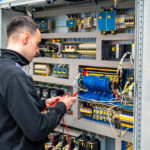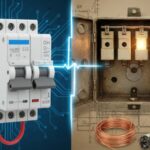An electrical panel upgrade may seem like a straightforward improvement, but did you know it typically requires legal approvals in most cases? There is a legal implication in upgrading for either increased power capacity or to replace outdated equipment, as it requires safety, legal compliance, and city ordinances. Now let’s learn the essentials that you should know about permit, which involves the application process and what happen if you don’t get the permit.
Signs You May Need a Permit to Upgrade Your Electrical Panel
Not all electrical work requires a permit. However, some projects—particularly those involving structural upgrades or load changes—need approval. At Solid Power Inc., we emphasize the importance of following proper procedures to ensure your safety and code compliance. The primary purpose of permits is safety. They assist in making sure that the work complies with national safety regulations and local electrical codes.
Here are the signs that will show you why or when you need an electrical permit:
- Increasing from 100 to 200 amps: A common problem in older homes with a limited supply.
- Moving an electrical panel: no need to require words of wisdom about this
- Installing a sub-panel, particularly when new appliances or outdoor units are connected
- Adding circuits for a new appliance: This typically means changing the load capacity
- If your work impacts the infrastructure or safety of the home, there is a high likelihood that you will need a building permit.
- What Happens If You Skip the Permit?
Going without a permit may feel like it’s the easiest route to take, but it can be a very costly risk. Doing an Electrical Panel Upgrade without a permit could come back to haunt you in many ways, both legally and financially.
Potential risks of not getting a permit include:
- Unsuccessful inspections when selling your home
- Homeowners’ insurance policy exemptions
- City-issued fines or stop work orders
- Liability in other accidents
When selling your home, homeowners or agents usually demand home inspection reports. Lack of relevant permits may equate to red flags.
Understanding Electrical Permit? What You Need to Know!
Before the Electrical Panel Upgrade, check with your local building department for permits. Electrical permits are approvals issued by a municipality or local authority that allow specific electrical work to be completed safely and legally. When updating your panel, you’re creating a change in your home wiring and electrical load, which can be dangerous when materials are not installed correctly. Permits will help ensure the code is being followed.
Let’s see what you should know about electrical permits:
| Why are electrical permits required? |
| Work meets local electrical codes and national safety standards. |
| Work is completed by a licensed professional. |
| Work inspection is important to ensure safe electrical installation. |
| Protects your home from electrical fires or overload. |
Not getting the permit may save you time now, but it results in higher risks later on, which are not worth taking.
Process of Receiving a Permit for Electrical Panel Installation
You generally need an electrical permit for any electrical work that involves alterations, additions, or upgrades to wiring systems in existing buildings, as well as for all new residential and commercial construction. The method for securing electrical permits is straightforward but requires careful attention to detail.
Here is the step-by-step procedure that will show you how to apply for an electrical permit:
| The Process of Applying For a Permit! |
| Step 1 – Contact Your Local Building Department Start by reaching out to the permitting office in your city or county. Each location has different regulations, so get the specifics straight from the source. |
| Step 2 – Submit Permit Application and Required Documents Once you confirm the requirements, you’ll need to submit a formal application with all the required documents, such as the application form, electrical layout, and contractor’s license, etc. |
| Step 3 – Pay the Required Fees After submitting your documents, you’ll need to pay a permit fee. |
| Step 4 – Permit Review and Approval Timeline Once your application is in, the city reviews it for code compliance and safety. |
| Step 5 – Schedule Inspection After Work Is Done After your electrician finishes the upgrade, you must schedule a city inspection. |
Conclusion
When it comes to Electrical Panel Upgrade, the entire process is more than just a hardware change—it’s likely to be your largest safety and code compliance measure. The consequences of not applying for a permit for your panel upgrade could cost you more in legal, financial, and insurance ramifications than the trouble of completing the application, which is relatively minor in its time commitment. Permits are a layer of protection against potential catastrophes, ranging from electrical fires to easier property transfers.
FAQs:
1. Why do I need a permit to upgrade my electrical panel?
A permit ensures the work meets local electrical codes and is inspected for safety and compliance.
2. What happens if I upgrade my electrical panel without a permit?
Unpermitted work can lead to fines, safety issues, insurance problems, and failed inspections when selling your home.
3. Who issues the permit for an electrical panel upgrade?
Your local city or county building department typically handles permits for electrical upgrades.
4. Do I need to hire a licensed electrician for a panel upgrade?
Yes, most jurisdictions require a licensed electrician to perform permitted panel upgrades.
5. How long does it take to get a permit for an electrical panel upgrade?
It can take anywhere from a few days to a couple of weeks, depending on your local authority’s process.


